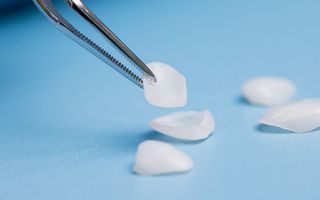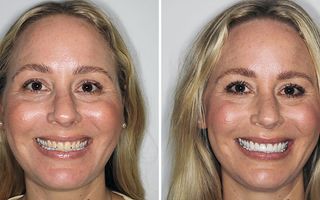
Veneers
Restore the front surface of your teeth by covering damage, discolouration, or minor misalignment with veneers.
Veneers
Restore the front surface of your teeth by covering damage, discolouration, or minor misalignment with veneers.
Porcelain and composite veneers restore the front surface of your teeth by covering damage, discolouration, and minor misalignment.
They can be an excellent alternative to dental crowns, whitening treatments, and traditional braces, and improve the appearance of your smile while protecting the quality of your teeth.
What are veneers?
Veneers are very thin shells that are permanently stuck to the front of your existing teeth. They are shaped and coloured to match your natural teeth, so they fit in perfectly with your smile.
They are an easier option than crowns because while crowns require a full covering for your entire tooth, veneers only require a single front shell to cover just the front of each tooth. Veneers are either made from composite materials or porcelain, each of which has its benefits.
Depending on your needs, preferences, and the condition of your teeth, you can choose one of the following types of veneers with the help of your dentist:
Composite veneers (direct veneers)
Composite veneers are the most common type and are popular for their lower cost and fast application. They are custom-made out of composite material that is added to the front of your tooth by an experienced cosmetic dentist.
Composite veneers are used to mask discolouration, brighten teeth, and improve the look of your smile. These veneers are usually used for minor cosmetic issues, such as cracking and chipping, but they can also cover small gaps between teeth.
This procedure requires little or no anaesthesia and can be the ideal choice for improving the appearance of the front teeth. In preparation for composite veneers, your dentist may need to remove a portion of enamel from the outer surface of your teeth to allow room for the veneers. The dentist will then bond the resin veneer to your tooth and mould it to the desired shape.
Porcelain veneers (indirect veneers)
Porcelain veneers are a non-invasive treatment and are a relatively quick way to enhance the natural look of your smile.
As the name suggests, porcelain veneers are porcelain tooth-shaped shells that are bonded to the surface of the tooth. The porcelain material is strong and durable making it an ideal option for long-lasting results, if properly cared for.
Similar to dental crowns, porcelain veneers are manufactured outside the mouth, and installing them sometimes requires two appointments. Porcelain veneers are a better choice for large cosmetic issues and teeth misalignment. The light-reflective and translucent appearance of veneers is designed to mimic the natural enamel.

Who can benefit from dental veneers?
Veneers can be a good option for people with:
- Tooth discolouration, which can't be treated by traditional tooth-whitening options
- Worn-down teeth
- Teeth with minor damages, such as chips and cracks
- Misaligned teeth
- Uneven teeth
- Minor gaps between teeth
During your consultation, your dentist will discuss the pros and cons of composite and porcelain veneers, and explain if they're a viable option for you.

It is important to understand that veneers are a cosmetic solution. They make teeth look better without treating them. Serious problems such as tooth decay can't be fixed by applying veneers, and any outstanding oral problems must be resolved before you get veneers.
Who shouldn't get veneers?
While the majority of people with minor tooth damage, discolouration, and misalignment issues can benefit from getting veneers, there are cases when veneers might not be suitable for you:
- Limited tooth substrate (not enough enamel for bonding or poor-quality enamel).
- Bruxism (teeth grinding or clenching can lead to veneers chipping, breaking, and detaching from the tooth).
- Previous large restorations (if the tooth has already been restored several times, a crown may be a better solution than a veneer).
- Poor oral hygiene (this can lead to serious problems thus making veneers useless).
- Severe gum disease (all gum issues must be treated before considering veneers).
During your first consultation, your dentist will discuss all the options. It's important to have excellent periodontal and general oral health for veneers to be effective and last long.
Whether you opt for composite veneers or porcelain veneers, we will guide you through the entire process. Get in touch with our friendly team to schedule an appointment.
Frequently asked questions
The cost of veneers varies depending on the number of veneers, the scale of treatment required as well as the type of veneers that you get, and your private health insurance.
Your dental insurance may cover some of your treatment, so be sure to check with your provider.
If you are unhappy with your smile, veneers can be an excellent solution. However, any cosmetic procedure requires careful consideration. At National Dental Care, we are always happy to consult you about veneers and other tooth restoration options. If you want to learn more, please contact us to book an appointment today.
No, veneers don’t ruin your teeth. While your dentist will remove a thin layer from the front of your tooth to make room for the veneer, the veneer is then permanently cemented in place. This strengthens your tooth, makes it resistant to staining, and improves the look of your smile.
It takes two to three appointments for the full process, which each take one to two hours.
Not typically. Your dentist will usually numb the area before the treatment for added comfort, but since the procedure is minimally invasive, there is very little discomfort, if any.
Neither Composite nor Porcelain Veneers require extensive care. All you have to do is brush your teeth twice a day and floss as per usual. Your dentist may also recommend wearing a bite guard at night to extend the lifespan of your veneers.
While permanent veneers are highly durable, we recommend that you avoid eating extra-hard foods, as well as foods that will stain your teeth such as rich curries.
Eventually, the bond between your veneer and the tooth can weaken and the veneer can come off. This will depend on the type of veneer and how well you care for it.
If your veneer does fall off, keep it and take it to your dentist. If it is still in good condition, your dentist may be able to reattach it. Otherwise, they can create a new veneer to replace the old one.

